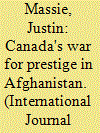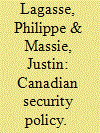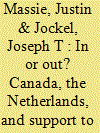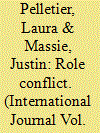|
|
|
Sort Order |
|
|
|
Items / Page
|
|
|
|
|
|
|
| Srl | Item |
| 1 |
ID:
124412


|
|
|
|
|
| Publication |
2013.
|
| Summary/Abstract |
This article provides a comprehensive assessment of Canada's prolonged and sizable military engagement in the war in Afghanistan in light of confounding expectations set by realism. It argues, from the perspective of neoclassical realism, that United States unipolarity, domestic elite consensus on an Atlanticist security policy, and executive autonomy vis-à-vis public dissent best account for Canada's evolving Afghanistan policy. These necessary conditions can be generalized to apply to past and future allied coalitions of the willing to help make sense of Canada's alliance burden-sharing.
|
|
|
|
|
|
|
|
|
|
|
|
|
|
|
|
| 2 |
ID:
094577


|
|
|
| 3 |
ID:
124760


|
|
|
|
|
| Publication |
2013.
|
| Summary/Abstract |
This article critically examines the purposes and objectives of the Organisation internationale de la Francophonie (OIF). While analysts debate whether the OIF is a hegemonic or counter-hegemonic instrument of statecraft, we argue that it is an institution founded upon the principle of geopolitical ownership of a distinctive geocultural space. Its prime task, with regard to conflict resolution, is to help transfer responsibilities and capabilities from northern to southern member states. From this perspective, we contend that the OIF has progressively taken charge of a distinct and necessary geocultural role with regard to international security.
|
|
|
|
|
|
|
|
|
|
|
|
|
|
|
|
| 4 |
ID:
156927


|
|
|
|
|
| Summary/Abstract |
How do democratic allies manage their participation in U.S.-led coalition operations? This article compares the Canadian and Dutch management of domestic and international expectations of support to the 2003 invasion of Iraq. It argues that the decision whether to support coalition operations often does not amount to a simplistic “yes” or “no” answer. It entails a management process involving several strategies, as well as a wide range of mutually inclusive support options. Canadian and Dutch management of support to coalition operations reveals that similarly core U.S. allies misunderstood U.S. expectations, mismanaged their country's stance by sending confusing signals to both their domestic and international audiences, and adopted varied trade-off strategies. The study of multinational coalition operations should thus conceptualize political and military support separately, but examine their causal interrelationships and measure them on a qualitative, case-specific continuum, in order to properly understand the variations and trade-offs involved in the allied management of support to military coalitions.
|
|
|
|
|
|
|
|
|
|
|
|
|
|
|
|
| 5 |
ID:
094579


|
|
|
| 6 |
ID:
145096


|
|
|
|
|
| Summary/Abstract |
This paper examines the domestic enablers and constraints to oversized coalition burdensharing. Using the Canadian case study, it explores the conditions under which state leaders are successful in imposing their policy preferences to a critical public, despite little tangible benefits in return. The paper develops a neoclassical realist framework which focuses on domestic determinants of alliance burdensharing, namely elite consensus, strategic culture, strategic narratives, executive autonomy, and social cohesion. This framework helps make sense of Canada's distinct case of public contestation and policy resistance by making two broad arguments. First, ineffective strategic narratives and strategic subcultures explain Canadian public opposition to Canada's combat mission. Second, an unmobilized public opinion, due to elite consensus, best accounts for Ottawa's policy unresponsiveness and hence its decision to maintain the coalition's fourth largest combat presence in Afghanistan from 2006 to 2011.
|
|
|
|
|
|
|
|
|
|
|
|
|
|
|
|
| 7 |
ID:
155769


|
|
|
|
|
| Summary/Abstract |
This paper seeks to understand the peculiarity of the Trudeau government’s decision to withdraw Canadian fighter jets from Iraq and Syria. Most studies have focused on electoral turnover to account for early withdrawal from coalition operations. Yet no study offers a plausible explanation for why a centrist challenger, such as Trudeau, favoured early withdrawal despite public support and alliance pressure for continued involvement, and committed when in power to a bolder and riskier mission while withdrawing valued military assets from coalition operations. Building on foreign policy role theory, we argue that role conflict best explains the particularity of the Trudeau government’s withdrawal decision. In the wake of the 2015 federal election, the Liberal Party of Canada witnessed an intra-party conflict over which role to perform between that of a faithful ally and a good international citizen. The party leader finally proposed a compromise mission making Canada more involved on the frontlines.
|
|
|
|
|
|
|
|
|
|
|
|
|
|
|
|
|
|
|
|
|